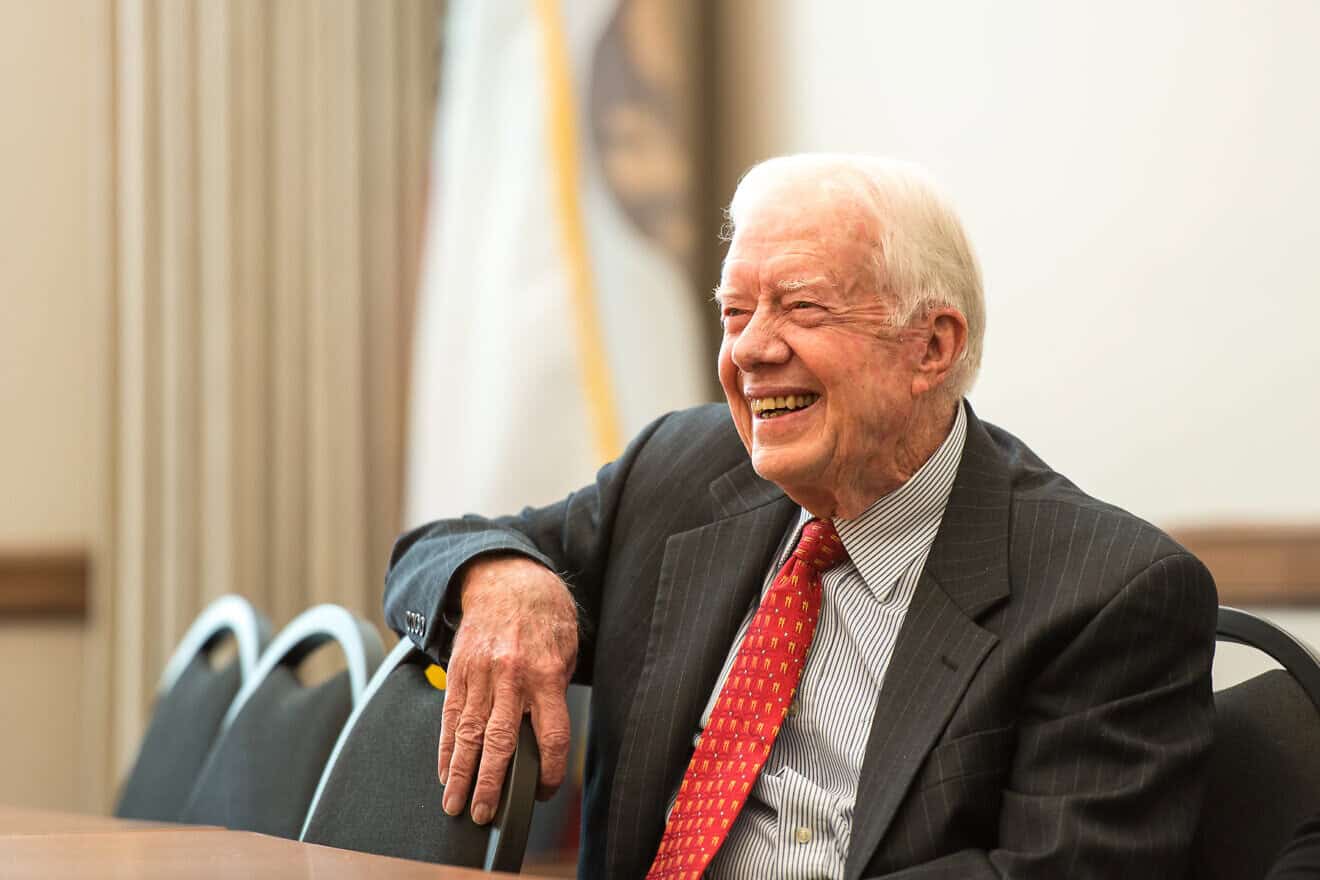Forgive me if I don’t join in the rush to canonize Jimmy Carter. He deserves respect for serving as president and for some meritorious accomplishments, but he was also one of, if not the most, anti-Israel president in history. Though hailed as a peacemaker, his actions and statements, particularly after leaving office, show a much darker side steeped in antisemitism.
Carter said in 1977 that his strong stand against the Arab League boycott “was one of the things that led to my election.” His position had been drafted by Rep. Benjamin Rosenthal’s (D-N.Y.) office to attract Jewish voters. The strategy paid off. If only one in nine New York Jews who voted for Carter had gone for Gerald Ford, the president would have been re-elected.
After his election, however, Carter backed away from his campaign commitment to fighting the boycott, undermining the trust Jews placed in him. He was more concerned with America’s dependence on Arab oil and his messianic vision of bringing peace to the Middle East. Anti-boycott legislation was seen as having the potential to upset the Arabs, and thereby endanger U.S. oil supplies and his peace efforts. Still, momentum for legislation had grown since it was introduced in the Ford administration, and the pro-Israel and business lobbies negotiated a compromise that led to its passage. The legislation outlawing cooperation by U.S. companies with the boycott is one of Carter’s enduring contributions to Israel. Still, he didn’t view it as important retrospectively, devoting just one paragraph in his memoir to expressing his outrage towards the boycott and claiming credit for the outcome.
One of his early decisions that drew the ire of Israel was linking aid to the cancellation of Ford’s sale of concussion bombs and his approval of the sale of Israeli-built Kfir jets to Ecuador. Under pressure, he agreed to allow Israel to receive arms needed for its security but refused to reverse his decision on the bombs and jets.
Far more problematic for most Jews was his attitude towards the Palestinians. He saw Palestinians as being in a similar situation to American blacks. He believed the treatment of Palestinians in the disputed territories was contrary to the moral and ethical principles of the United States and Israel.
Carter was the first president to call for a “Palestinian homeland.” He later became determined to leverage Israeli peace with Egypt to force Israeli Prime Minister Menachem Begin to agree to make concessions to the Palestinians, a strategy like the one unsuccessfully employed by the Biden administration to achieve Saudi normalization with Israel.
The Israel-Egypt peace treaty is rightly lauded as Carter’s greatest foreign-policy accomplishment. What is less remembered is how much he did to impede the negotiations. Carter wasn’t interested in a bilateral agreement; he had a misguided vision of a comprehensive Middle East peace that he believed could be reached at an international conference in Geneva. When Prime Minister Yitzhak Rabin came to the White House, Carter told him U.S. support for Israel would be damaged if he refused to accept the Palestine Liberation Organization’s participation and was the first president to call Israeli settlements illegal. Carter insisted that the Jewish states accept only “minor adjustments” to the 1967 borders, causing an uproar because it was inconsistent with Israel’s determination to maintain “defensible borders.” Carter pressured Israel to “accept the situation that we think is fair.” (emphasis added)
He tried to enlist the help of Syrian President Hafez Assad with the PLO. Despite finding Assad “extremely antagonistic” towards Israel, he praised the dictator as a “strong supporter in the search for peace.”
After the election of Menachem Begin, Carter said that his call for a Palestinian homeland didn’t imply the creation of a Palestinian state, which he said would be a threat to peace, but he envisioned an entity associated with Jordan. Whatever goodwill that statement gained was offset by the subsequent revelation that the administration was in contact with the PLO and that it agreed to negotiate with Yasser Arafat if he accepted either Israel’s right to exist or U.N. Security Council Resolution 242. This violated Secretary of State Henry Kissinger’s agreement with Israel that the PLO must meet both conditions.
Meanwhile, Israel and Egypt had begun secret talks in Morocco. President Anwar Sadat recognized that Carter’s idea of an international conference would allow his rivals to veto a deal with Israel and took matters into his own hands by making his historic trip to Jerusalem in November 1977. Carter and his advisers were furious that Sadat had undermined their Geneva gambit. Morton Kondracke of The New Republic wrote that Carter’s unwitting “freshman-year ineptitude scared Sadat into dramatic independent action.”
To his credit, Carter reversed course and convened the talks at Camp David. He was hardly the honest broker his supporters claim. After the 1978 congressional election, he said he was willing to sacrifice re-election because of alienating the Jewish community. Still, Carter believed it was necessary to side with Sadat and pressure the Israelis. His effort to leverage the Palestinian issue, however, failed because he recognized Sadat “did not give a damn about the West Bank.”
Carter was desperate for an agreement as his political standing deteriorated. Failure was seen as a potential death knell to his re-election. He realized he had little influence over Israel and consequently accepted an agreement that did not resolve what he considered the major issues.
Carter later used Israel to sell America’s most sophisticated fighter jets to Saudi Arabia. Israel objected because it threatened its qualitative military edge. Carter packaged the sale with jet transfers to Israel and Egypt to win approval, and said it was all or nothing. AIPAC objected: “By placing Israel in the same category as Saudi Arabia and Egypt, the administration is obviously trying to make the Arab sales more acceptable to Congress, but the administration is also abandoning America’s traditional special relations with Israel.” As would happen in subsequent arms fights, AIPAC lost. The fight added to the Jewish perception of Carter as an unreliable ally.
As the election approached, Carter was embarrassed by his U.N. ambassador, Andrew Young, who was forced to resign when it was revealed that he had arranged secret meetings with representatives of the PLO. It was the last straw.
In 1980, Jewish voters abandoned Carter—first for Sen. Edward Kennedy in the primaries, and then for Gov. Ronald Reagan and Illinois Rep. John Anderson in the general election. Carter won only 45% of the Jewish vote (compared to 66% this past November for Vice President Kamala Harris); Reagan got 39%. This was the worst showing among Jewish voters for a Democratic presidential candidate since James Cox in 1920. Jews voted against Carter for the same reasons as other Americans, but his policy towards Israel undoubtedly led to the drop in his share of the Jewish vote from 71% in 1976.
Carter’s disdain for Israel’s leaders is a recurring theme in his diary, referring to them as “obstinate and difficult,” “recalcitrant” and “intransigent.” For example, Yitzhak Rabin was “ineffective,” “timid, stubborn and also somewhat ill at ease.” Begin, who he initially believed was “congenial, dedicated, sincere and deeply religious,” became “a small man with a limited vision.” Carter wrote after one meeting at Begin’s home that he had “rarely been so disgusted in all my life.” By contrast, he found Sadat “charming,” “strong and courageous.” After the three men received the Nobel Peace Prize, Carter wrote: “Sadat deserved it; Begin did not.”
Carter partly blamed his electoral defeat on the Jews, and his animus was reflected in his post-presidency statements and writings. His attitude towards Israel was also influenced by his conviction that Begin lied to him (he didn’t) about freezing settlements.
While he is rightly lauded for his humanitarian work, his antisemitism tarnished his legacy. His book, Palestine: Peace Not Apartheid, was filled with falsehoods and the misrepresentation of history. He even contradicts the calumny in the title when he says, “The driving purpose for the forced separation of the two peoples is unlike that in South Africa.”
Even though he helped facilitate Israel’s peace with Egypt, which included the evacuation of Sinai, Carter repeatedly asserts that Israel does not want peace, is stealing Palestinian land, and refuses to trade land for peace.
Michael Oren, former Israeli ambassador to the United States, said when he reviewed the book that he was shocked by Carter’s “not-so-subtle antisemitism.” Oren also noted that Carter was a Hamas apologist.
Professor Deborah Lipstadt criticized his insinuations about Jewish control of media and government. Carter was angry about the negative comments about his book, and even as he was making the rounds promoting the book in the press, he complained about the “tremendous intimidation in our country that has silenced” Israel’s critics.
Sadly, the former president became one more anti-Israel propagandist, demonizing the Jewish state at every opportunity and spouting the one-sided narrative of the antisemites.
As I wrote in a review of the book, few, if any, Jews realized just how nefarious Carter’s views were until he left office. In retrospect, their votes against him may have saved Israel.


























